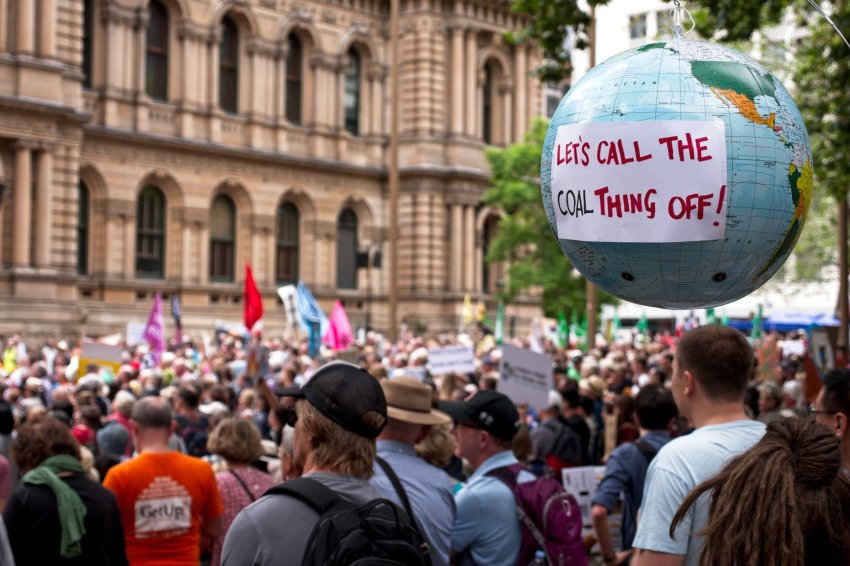
Imagine we are all passengers on a bus careering down a hill towards a cliff. The bus is getting faster and, despite our desperate pleas to the driver to change course, it continues to head towards the precipice. Finally, the driver assures us they will jam on the brakes … two metres after we go over.
With rising concern about the seriousness of the climate crisis, spurred on by the bushfire disaster, “net zero by 2050” is becoming the default position of politicians and fossil fuel corporations who want to be seen to be doing something, all while sticking to business-as-usual.
Among those lining up behind this phony target are several state Labor governments, the Business Council Australia and independent MP for Warringah Zali Steggall.
The greatest danger is that in our desperation for a shift in policy, climate campaigners will not see this smoke and mirrors act for what it is.
Perhaps Steggall sincerely believes her bill for net zero emmissions by 2050, coupled with five-yearly reviews, will be the catalyst for real action. But it is dangerous, because it rests on the false assertion that reaching net zero emissions by 2050 will be sufficient to reach the Paris target to limit the world to a 1.5°C rise in warming.
The science is clear: to stop runaway warming we will need to create net zero emissions economies and societies well before 2050. At a minimum we need 100% renewable energy by 2030.
Furthermore, we need to make reductions early, because warming will continue before positive change kicks in. Leaving the serious emissions cuts to the last decade before 2050 is not only implausible, it risks triggering a series of positive feedback loops, such as the melting of permafrost in Siberia, which will unleash methane and propel more warming.
The 2019 report Production Gap already sounded the alarm that, globally, governments are planning to produce about 50% more fossil fuels by 2030 than would be consistent with limiting warming to 2°C and 120% more than would be consistent with limiting warming to 1.5°C.
As Green Left reported in December: “A bleak assessment released by the United Nations' Environment Programme last month warned that nations need to up their emissions-reduction pledges by a factor of five to have any hope of limiting the global temperature increase to 1.5 °C above pre-industrial levels, the goal set in Paris.
“Staying below a 2°C increase, the threshold beyond which scientists say the worst effects of climate change will begin to take hold, will require a threefold increase in national commitments.”
Worldwide emissions are still rising, although at a slower rate. But this is small comfort when they need to be dropping.
In the United States and Europe, emissions are on track to start declining, although nowhere near fast enough, as coal-fired power starts to come offline.
Everywhere else, emissions from gas are rising, especially in Australia.
In Western Australia, the gas industry pumps out 32 million tonnes of carbon dioxide a year and the rise in production over the past 15 years has undone all the carbon pollution reductions across the rest of the country.
The WA Labor government and oil and gas company Woodside are both pushing for a huge expansion of the industry that would lift this carbon dioxide output to a staggering 139 million tonnes a year. Yet both have pledged support for the net zero by 2050 target, with no plan as to how to get there while actually pushing emissions up.
This meaningless and dishonest posture illustrates that there is a political force just as dangerous as the climate change deniers: the climate change fakers.
Steggall’s bill appeals to those who do not have confidence that the emerging climate movement can build up enough power to win its demands, including for no new coal and gas — starting now.
There is no apolitical path to win a safe climate. Without an intense political struggle that challenges very powerful interests, we will not be able to transition to net zero emissions across the whole economy.
This challenge is particularly acute in a country where fossil fuel companies wield huge power. To break their grip over our economy and politics, the only real roadmap is to build an unprecedented social movement in the streets, workplaces, communities and in our places of education.
By all means, let’s support pieces of legislation that help the climate movement achieve its goals, such as Greens leader Adam Bandt’s Coal Prohibition (Quit Coal) Bill 2019. But vague proposals that put off serious change to 2050 and entrust the current crop of politicians to carry it through will take us backwards.
[Sam Wainwright is a unionist, climate activist and Socialist Alliance councillor in the City of Fremantle Council.]